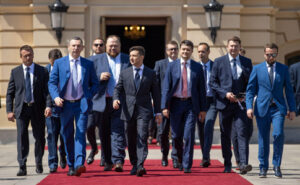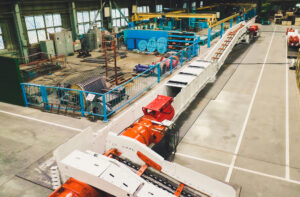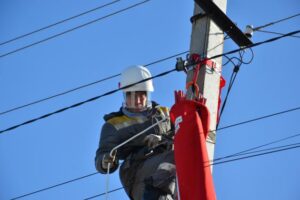
Over the past five years, 41 MPs have left the Servant of the People faction, 21 of them resigned and another 20 joined other factions and groups, while the number of the faction has decreased from 254 to 233 members, according to a study by the Chesno movement based on the results of the work of the Verkhovna Rada of the IX convocation.
“According to the results of the 2019 elections, the Servant of the People managed to bring a record 254 deputies to the Rada – 124 list members and 130 majority members, who formed a mono-coalition for the first time in the history of Ukrainian parliamentarism. Formally, the “servants” still manage to maintain a majority in the parliament, as the faction still has more than 226 members. And this is despite the fact that 41 MPs have left the faction in five years,” the Chesno movement said on its website on Wednesday.
The report notes that some MPs left the faction due to their transfer to other positions, others because of high-profile corruption scandals or disagreement of individual MPs with the party line.
Three “servants” – first the list leader Dmytro Razumkov and Ruslan Stefanchuk, and after the roll call – Oleksandr Kornienko – joined the parliamentary leadership, so they formally left the faction and became non-factional. However, after Razumkov was recalled from the speaker’s post at the end of 2021, he did not return to the faction: thus, the first number on the Servant of the People list remained unaffiliated.
At the same time, Razumkov published a list of deputies of the new inter-factional association “Smart Policy,” which included 21 “servants,” but formally remained members of the faction. At that time, only two representatives of Razumkov’s group, Lyudmyla Buymister and the scandalous Odesa majoritarian Artem Dmytruk, were expelled from the Servant of the People. A few weeks later, another member of Razumkov’s MFO, Roman Sokha, left the faction.
Due to internal disagreements, in December 2019, majoritarian members Hanna Skorokhod and Anton Polyakov were also expelled from the Servant of the People, who later joined the For the Future group. At the same time, MP Roman Ivanisov was expelled from the faction because of information about his rape conviction.
The authors of the study recall that almost a year later, Geo Leros was expelled from the faction for criticizing the president and accusing the head of the OP, Andriy Yermak, and his brother of trading positions. The last high-profile “divorce” was the departure of Mariana Bezuhla from the faction. A few days after that, Yulia Yatsyk also left the faction on the third attempt.
It is noted that many “servants” left the faction amid high-profile corruption scandals. In particular, Kyiv majoritarian Oleksandr Yurchenko, whom NABU suspects of bribery, was expelled from the Servant of the People. In 2022, Oleh Voronko left the faction, and proceedings were opened against him for forgery.
And in 2023, Mykola Tyshchenko was expelled from the Servant of the People after his trip to Thailand, Bohdan Torokhtiia because he vacationed abroad during martial law, and Anatoliy Hunko, who was caught taking bribes.
Three MPs suspected of treason also left the faction. Thus, in the spring of 2021, the “servants” expelled majoritarian Oleksandr Dubinsky because he was included in the US sanctions list. A few months later, another majoritarian, Yevhen Shevchenko, who had publicly supported Belarusian dictator Alexander Lukashenko, was expelled from the faction. In 2022, the Servant of the People also expelled collaborator MP Oleksiy Kovalev, who had been actively helping the Russians in the occupied Kherson region since the beginning of the invasion.
“It is noteworthy that six notorious ‘servants’ ended up in the Restoration of Ukraine group, saving the association of pro-Russian MPs from possible collapse. Thus, in December 2023, when Anatoliy Hunko joined the group, it again had 17 MPs, which is the minimum number allowed (because for a parliamentary group to exist, it must include at least as many MPs as the smallest faction of the Rada),” the study notes.
Source: https://interfax.com.ua/

Registrations of new commercial vehicles (trucks and special vehicles) in November 2024 increased by almost 6% compared to the same month in 2023 – up to 1089 thousand units, Ukravtoprom reported in its telegram channel.
According to the association, compared to October of this year, the demand for such cars increased slightly by 1% (or 7 cars).
The Renault brand confidently holds the market leadership with 233 units, while Citroen retained the second place with 143 cars registered. Mercedes-Benz moved to third place (from fourth in October) (100 units), followed by MAN (89 units) and Scania (59 units).
As reported, in November 2023, the top five leaders in the new commercial vehicle market were Renault (241 units), Peugeot (74 units), Ford (72 units), Mercedes-Benz (71 units) and MAN (67 units), and the overall market more than doubled to 1031 units compared to November 2022.
According to Ukravtoprom, in January-November of this year, more than 11.5 thousand new vehicles were added to the Ukrainian fleet of trucks and special vehicles, which is 14% more than in the same period in 2023.
As reported, in 2023, according to Ukravtoprom, registrations of new commercial vehicles in Ukraine increased by 65% compared to 2022 – up to 11.3 thousand units.

“Corum Druzhkovka Machine-Building Plant (Corum DrMZ), a part of Corum Group (DTEK Energy), plans to complete the delivery of the last batch of steel structures under a large order from DTEK Energy for the production of equipment for concentration plants in February 2025, the plant said on Facebook.
“In April-2024, the machine builders mastered the production of tanks, in June they added reloading devices, and in July the plant began working on the production of more than 500 units of metal structures of almost 100 varieties,” the statement said.
“Corum DrMZ clarifies that the largest parts in the order are 20 meters long and 2.2 meters wide, and their weight exceeds 4 tons. More than 400 tons of metal have already been used for manufacturing.
“There are high requirements for production, in particular in terms of welding seams and painting,” the plant notes.
“Corum DrMZ, which was relocated to Dnipro in 2022, according to the plant, produced 430 units of mining equipment in January-November this year, as well as more than 850 thousand units of components and spare parts.
In particular, in November, the company produced 5 units of shearers, more than 81 thousand components and spare parts, and repaired a KPD shearer. The products include trolleys, skip, cage, main ventilation fan, universal wheelsets, anchors, fire pipes and high-pressure hoses.
Corum Group is a leading mining equipment manufacturer in Ukraine. It is a part of DTEK Energy, an operating company responsible for coal mining and coal-fired power generation within Rinat Akhmetov’s DTEK energy holding.

In November, amid intensified hostile attacks on the country’s energy infrastructure, DTEK Grids’ distribution system operators managed to restore electricity to almost 1 million Ukrainian families whose homes were cut off due to shelling in Odesa, Dnipro, Donetsk and Kyiv regions.
“The enemy intensified shelling of the country’s energy infrastructure in November. Lines and equipment were destroyed by missiles or drones. Most of all, in Odesa region, which suffered devastating attacks,” the company said in a press release on Monday.
Last month, power engineers managed to restore electricity to the homes of 701.7 thousand families in Odesa region.
Over the same period, DTEK Grids restored electricity to 4.8 thousand families in Kyiv region whose homes were cut off as a result of another hostile attack. In November, enemy shelling also damaged power grids and equipment in the capital, and power engineers promptly restored power to 1.1 thousand homes of de-energized families.
“In the regions close to the hostilities, the power system also suffered from enemy artillery shelling and air strikes. In the last month of autumn, the enemy continued to attack Dnipropetrovska oblast, especially the south of the region,” the press release explains.
Over the past month, power engineers in Dnipropetrovs’k region have managed to restore electricity supply to 192.1 thousand families.
In Donetsk Oblast, which remains the scene of the most intense fighting, power engineers managed to restore electricity to 75.5 thousand households in November. The company’s specialists continue to restore power grids in the frontline region every day, as soon as the security situation and the military allow.
“Since the beginning of the full-scale war, we have already restored electricity to 16.1 million families in Kyiv, Odesa, Dnipro, Donetsk and the capital,” said Alina Bondarenko, CEO of DTEK Grids.
“DTEK Grids develops the electricity distribution and grid operation business in Kyiv, Kyiv, Dnipro, Donetsk and Odesa regions. The company’s DSOs serve 5.5 million households and 158 thousand enterprises.
Estimated number of population in regions of Ukraine based on number of active mobile sim cards (mln)

Open4Business.com.ua

Delta-Lotsman branch of the state enterprise Administration of Sea Ports of Ukraine announced a tender for voluntary insurance of employees against accidents on December 3, according to the electronic public procurement system Prozorro. As reported, the expected cost of services is UAH 4.333 million. Tender offers are accepted until December 11.
SE “Delta-Lotsman” was established by order of the Ministry of Transport of Ukraine in 1998 in order to improve the conditions for ensuring safety of navigation, protection of human life at sea and the environment, in the territorial sea of Ukraine in accordance with the requirements of international agreements and conventions, as well as to streamline the structure of marine pilot services in the north-western part of the Black Sea.